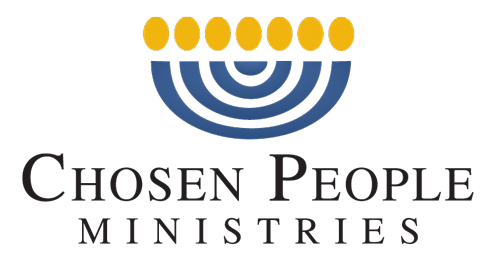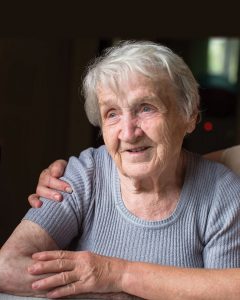An Interview with Esfir
 Tell us a little about yourself.
Tell us a little about yourself.
My name is Esfir Gershman. I came from the town Artemovsk in the Donetsk region. I was born there and lived there for some time before the War. When the War began, some of my relatives fled. Some were evacuated and my mother stayed behind with my father’s parents. They were very old, and my mother could not leave them. They did not have anybody else since my father was shot to death in 1939 when I was only 6 months old. On the first day when the Germans came, they shot my grandpa and grandma to death and took my mother to a work camp. Mom was taking me with her everywhere all the time as I was only 4 and a half years old. It happened that my mom and I were in the ghetto all of that time when she was taken. She was sent to work in Kostantinovsk in Donetsk region. After the work camp, she was buried alive in the alabaster quarry in Artemovsk. I was brought to the Gestapo office. We all were lined up and marched to a forest. Only later did we understand that they brought us there because there was already a pit with dead people in it. It was still some 200 or 300 meters to the pit when the firing started. Because the road was in the forest, the firing was both from the forest and the air. We all panicked. Then some strange old lady grabbed my arm and we fled through the forest. Not only did we, but others also, those who had managed to flee. Others were shot to death. We spent some days in the forest; I was scared, cold, and hungry. We came to some village, and we were given food there.
Tell me, what kind of food do you think you could get in a village in 1942?
A piece of a potato and wheat bread was a luxury. From there we went to Artemovsk again. I could not walk the streets so I was put in the basement. I would go for a walk in the night and during the day I would sit in the basement because if I had walked openly I would have certainly been taken. But the old lady to whom I was brought was obviously a wise woman. I had dark curly hair when I was little, so she took me to the church, baptized me and told me that I was Armenian, and she gave me her last name. The house where I lived was bombed and everything was burned. I was left with nothing. Then, three women, our neighbors, came to the city council to witness whose child I was. I got a birth certificate and learned who I was. I went to work in 1955, I graduated in 1956, then I moved to Konstantinovka which is close to Artemovsk. I am an obstetrician and went to work at the maternity hospital. After I had worked there for 15 years I became in charge of the first-aid post in the village. I got married, moved to Konstantinovka and stayed there. I have two children, a son and a daughter. My husband died of a stroke in 1985. It is a long and scary story. We were half starving, so we decided to pack up and move to Israel in 1996.
And you came to Sderot?
No, first I came to Holon, Israel. I lived there two weeks, but the apartment there cost 500 shekels. I could not afford that. I had a friend here in Sderot from Konstantinovka so I called her and asked her what I should do, that I cannot pay 500 shekels. She said, “Do you want to come to Sderot?” I said I want to go anywhere. So here I am now.
Tell us about Sderot.
I have been leading the Club of Holocaust and Ghetto Survivors here in Sderot for 16 years already. We have mostly younger ones, the 80 to 90 year olds. A 92, 93, and 98 year old have died recently. These are my people, very old and sick, but whenever we have some events I say do not give up, cheer up! In spite of it all! There were times when we had up to 60 Qassam rockets fired at our city. We could not go out to buy bread—we were sitting in our apartments. By the way, there is a bomb shelter in every apartment. We were absolutely quiet. We did not leave our houses, but the organization [Chosen People Ministries Israel] that Maxim represents and Michael Zinn, they help us. There are some other guys: Zhenya, Misha, and others. God bless them! Despite everything, they brought a huge truck of food. We got scared and told them to leave! You cannot be here! They stopped in our yard. They took food to those who lived closer and brought by car to those who lived further. We were afraid that they might get into something terrible. It was the most intense, “hot” operation. This organization really helps us a lot. Not only do they help with the monthly food packages, they help with such things as cleaning my apartment. The people here are very old, sick, people. Just recently we had amazing young people come! They helped to clean! Yet it is not all that this organization does. They organize tours, different events; of course, they are the ones to cover the cost. Thank you very much! Last year we even were at the Dead Sea for the whole week. One can name many things that they do. It is, of course, an amazing work! I pray that everything goes fine and we continue to partner with them. We have worked with them for many years; they know us all and we know them. All of them are simply wonderful!
What does Chosen People Ministries mean to you spiritually?
I would like to say thank you very much to all of your helpers and volunteers. They do such great things! You know, sometimes you can do it in an ordinary way but sometimes—putting all your soul into it.
They really put their soul into it. You see, it is not only about material things. It is also about the conversations that we have during fellowship where I learn more about God.
I can only say Baruch HaShem! Praise the Lord! We say Baruch HaShem in the morning and in the evening: in the morning—for waking up, and in the evening—for having lived another day.
Praise the Lord, the fridge is full, I have an apartment. I need to thank many times God and the providence that we are here in our state!
Many people for many centuries wanted to destroy us, the Jewish people, but they did not succeed and they will not succeed. And a thousand thanks to you, alfei todot, toda raba, thank you for all your care that you provide for us!
Many, many thanks to you.



